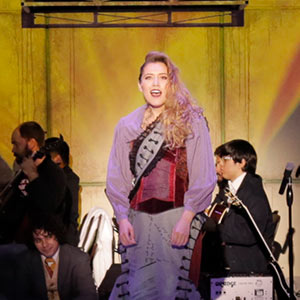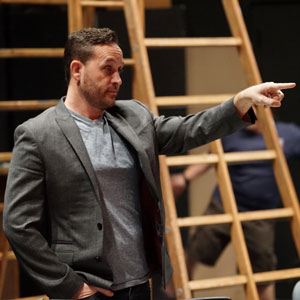"Wallenberg" depicts heroic WWII figure
— Fullerton College Hornet - Linda Bolard - Wednesday, November 29th, 2000
Starting Friday, Fullerton< College presents "Wallenberg," an original play based on historical facts, written and directed by Robert R. Jensen.
In the last months of World War II, the Nazis became preoccupied with leaving no witnesses to their atrocities. High on their list were the European Jews. The "final solution," the murder of as many Jews as could be managed, had escalated in 1944 and did not stop until the very end of the war. The Nazis had reasoned that if there were no witnesses, there would be no accusers.
In 1944 a young Swedish diplomat, Raoul Wallenberg, was sent to Budapest, Hungary to attempt to save some of the surviving Jews.
Wallenberg, a representative of independent Sweden, came to negotiate the protection, and hopefully exit visas, for at least some of the remaining Jews.
Financed by the Americans, Wallenberg saved tens of thousands of lives. His efforts were often inconvenient to the Germans, as well as to the Hungarians, and he faced the very real danger of losing his own life more than once. He refused to give up and remained -in Hungary until the end of the war.
Budapest was occupied by the Soviet army in the Spring of 1944. The Soviets arrested. Wallenberg, as they did many others whom they viewed as potentially dangerous to their regime, and transported him to the Soviet Union. All attempts to free him failed. Raoul Wallenberg spent the rest of his life as a Soviet prisoner and died in 1978 without seeing the results of his rescue mission.
The play opens with Wallenberg's decision 'to.accept the mission while realizing what a dangerous task it is. It then follows him into Budapest, as he meets Eichmann and various others who took part in this great game of death.
The set is built on a small, dark stage to create the mood. Using creative lighting and grays and blacks help to depict how oppressive fear is.
For Robert Jensen, characters all live with an underlying fear different degrees and faces of it but fear is always present, as it must have been at that time all over the world.
In a world where an accent marks you as a defective, Jensen has chosen to use a multitude of accents as they would be heard, then and now, in Europe.
But where the language, the well-staged combats, the directed mood and often the action of the play work, the actors often fail, possibly because they have no personal experience from which to draw , in order to deliver the feeling of amazement caused by the cruelty around them. Their bewilderment fails to transfer into credible fear.
Addison Glines, originally cast in the title role of "Wallenberg," is being replaced by FC alumnus Brian Kojac. Addison has left the play because of a devastating illness. Kojac won many awards while a student at FC, then went on to create three different theater companies, including his latest, STAGES, which is located on Commonwealth in Fullerton.








